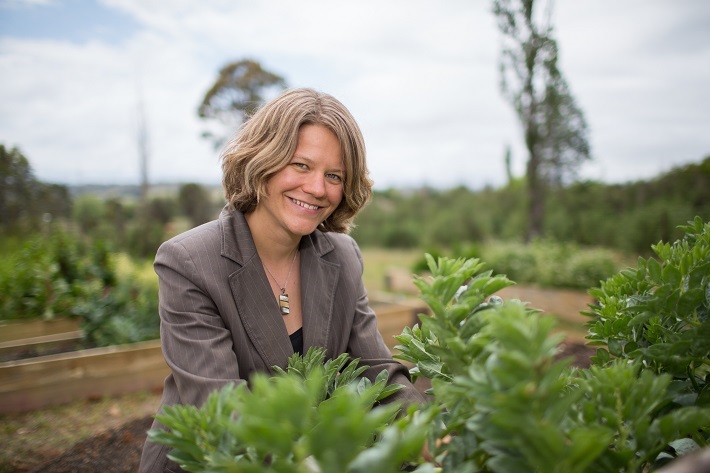A project from her home-town, inspired by the custodians of that country, will next year take UNE postdoctoral research fellow Kate Wright half-way around the world.
Kate has been awarded a prestigious six-month fellowship with the Rachel Carson Centre for Environment and Society in Munich, Germany. It will be a time to write and reflect on her experiences of helping to develop the Armidale Aboriginal Community Garden and the "cultural revival and anti-colonial activism" it has fostered.
Established on the site of the former East Armidale Aboriginal Reserve and a former town dump, the community garden has become a dynamic demonstration of how place and untold history can be reclaimed. Growing up in Armidale, Kate knew nothing of its stories.
"I didn't know there was a reserve where kids were dying in the '60s, amid racism that was rife in the community and its institutions until well into the late '80s," Kate says. "Despite attending primary and high school in Armidale, this traumatic but foundational local history was not part of any school curriculum. It’s a history that has been suppressed."
Kate says she is interested in the way that a place can hold history, and how the telling or withholding of that history impacts present-day life.
"History is often seen as a series of completed events in the past, distant from the present," she says. "I want to write about the way that the garden, through multiple healing processes, is changing the nature of the past by reclaiming it, and, through Aboriginal-led decolonisation and cultural revival, transforming the way environmental and social histories move through and affect places and communities in the present."
The very personal journey that Kate has undertaken during her research has posed many philosophical and ethical questions. "I've grappled with what I can do, as a non-Aboriginal settler-descended person, to support Aboriginal self-determination, to help decolonise places, institutions and communities, to foreground the voices of Anaiwan, Gumbaynggirr, Dunghutti and Kamilaroi people, and to conduct collaborative, experimental research with integrity," she said.
From Munich, she hopes to further that end, authoring a book that weaves community gardening, language revival, cultural traditions, Indigenous philosophy, dance, art, and social and environmental activism into a decolonising account of Aboriginal resilience and survival.


